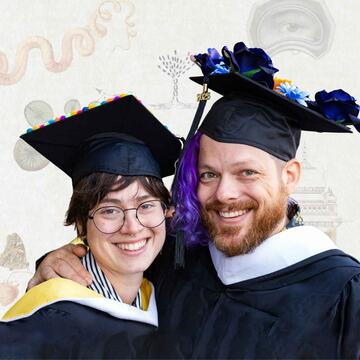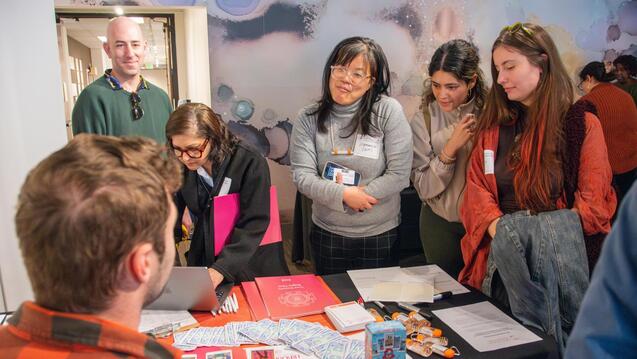
Doctor of Philosophy in Transformative Studies
Join a community of passionate scholars exploring innovative ways to make a difference in the world through our online Ph.D. program.
Program Overview
Our Approach
The online Ph.D. in Transformative Studies is an innovative, individualized, cohort-based, transdisciplinary degree that frames inquiry as a creative process.
It is individualized because the student’s research is on a topic the student is passionate about, not limited to one discipline, and developed in dialogue with faculty members with relevant expertise.
The cohort-based coursework ensures students have a strong and supportive learning community during their journey through the program.
We offered one of the first online doctoral degrees, starting in 1993, and we are also one of the world’s first transdisciplinary doctoral programs.
Transdisciplinary research is grounded in systems and complexity thinking. It emphasizes the importance of context, interconnection, and self-reflection. It sees every inquiry as an opportunity for self-inquiry and frames the research journey as a creative process.
Successful completion of the program requires a high degree of self-direction, motivation, and a passion for scholarship that is both rigorous and imaginative. The program is designed to provide a rich and diverse learning community and interactive learning experiences. Students are guided in finding a research topic that inspires them and can be supported by faculty. The faculty guides students in developing dissertation topics that match the current interest areas and expertise in the department
Students should familiarize themselves with the faculty’s interest areas to ensure that their research topic can be supported. Current faculty interest areas include, but are not limited to, creative futures, extraordinary abilities and beliefs, ecopsychology, sustainability, comparative religions, systems theory and complex thought, new religious movements, leadership, social change, and creativity.
Career Paths
As a Ph.D. program, Transformative Studies admits students who have earned a master’s degree, many of whom are already situated in a career that is reflected in their dissertation topics. Our graduates go on to contribute to the development of better research and scholarship in their professional areas of work, such as:
- Faculty, deans, directors at universities
- Consultants on business, social and environmental issues
- Coaches focusing on personal and professional development
- Researchers in think-tanks and related organizations
- Leaders in organizations focusing on issues including the environment, personal development, technology.
Curriculum
The Transformative Studies Ph.D. consists of a minimum of 36.6 semester units (two years of full-time coursework and participation in four intensives) plus a dissertation. The program includes 18 units of foundational courses and 12 units of electives, which may be taken from elective courses offered at the University.
Throughout the two years of online coursework, all students meet for virtual intensives twice per year, at the beginning of fall and spring semesters. Participation in all intensives is mandatory.
Coursework concludes with two comprehensive exams in essay form. One is the literature review for the student’s dissertation topic, the other addresses the chosen research methodology for the student's dissertation.
Curriculum Highlights
TSD 8126 Creative Inquiry: Scholarship for the 21st Century (2 units) This course provides an introduction to research as a creative and transformative process. It will address issues such as the relationship between the academic and the transformative; what it means to be a scholar in the 21st century; how to get in touch with one’s research passion and integrate it into one’s coursework; how to think about research in a way that integrates personal reflection and personal growth with solid, grounded scholarship in an academic context; what the role of the literature review is and how to approach it; and how to develop one’s academic voice. The knowledge base is drawn from the philosophy of social science, educational and developmental psychology, creativity research, complexity, and inter- and transdisciplinarity theories and research.
TSD 8210 Systems Thinking for Research on Self, Society, and Transformation (3 units) This course introduces students to systemic thinking and foundational concepts of systems theory informed by various lineages (e.g. cybernetics, general systems theory, family systems theory, complex thought, etc.). The purpose of this course is to understand the role of theory in inquiry and how systems and complexity theories provide a fundamental paradigm that is an alternative to traditional and reductionist scientific inquiry. Systems thinking is by its very nature transdisciplinary and can be a catalyst for thinking outside a disciplinary box about any issue of interest and at any scale — self, organization, and society. Students will discover how systems theory can help them explore multiple perspectives and complex interrelationships associated with their current dissertation topic idea, and use these to develop their dissertation inquiry.
TSD 6526 The Ecology of Ideas (3 units) All inquiry is situated in an ecology of ideas, which is to say the literature for a dissertation, including: scholarly articles, books, essays, and/or cultural artifacts. This course supports students as they identify, evaluate, and orient themselves within all this dissertation literature. The course explores the nature and role of theory in any inquiry. Finally, it prepares students to develop and articulate their own stance and theoretical orientation for any type of dissertation, whether it be qualitative or theoretical.
-
Semester 1 | Fall
TSD 6001 Online Intensive I (.1 unit)
TSD 8005 Introduction to Transformative Studies (3 units)
TSD 8126 Creative Inquiry: Scholarship for the 21st Century (2 units)
TSD 8210 Systems Thinking for Research on Self, Society, and Transformation (3 units)
TSD 8216 Navigating Complex Information Ecosystems for Research Praxis (1 unit)
Semester 2 | Spring
TSD 6002 Online Intensive II (.1 unit)
TSD 8130 Transdisciplinarity: Complex Thought and the Pattern That Connects (3 units)
TSD 8215 Varieties of Scholarly Experience (3 units)
Semester 3 | Fall
TSD 6003 Online Intensive III (.1 unit)
TSD 6526 The Ecology of Ideas (3 units)
TSD 8218 Qualitative Research Methods for Transdisciplinary Scholars (3 units)
Semester 4 | Spring
TSD 6004 Online Intensive IV (.1 unit)
Comprehensive Exams - (6 units)
TSD 9610 Essay - Dissertation Literature Review (3 units)
TSD 9611 Essay - Dissertation Research Methodology (3 units)
Electives (9 Units)
Total units for the degree coursework - 36.4
Dissertation Proposal
TSD 9800 Dissertation Proposal Completion (.1 unit per semester and up to 4 semesters to complete)
Dissertation
TSD 9900 Dissertation Writing (.1 unit per semester and up to 8 semesters to complete)
Creative Futures Focus
The Creative Futures Focus challenges students how to think about compelling futures, envision what better futures might be like, and explore emerging practices that support the creation and embodiment of more desirable personal and collective futures. The focus is an official designation that requires three courses (two mandatory, one selected from a list of electives), and when completed will appear on students' transcripts.
Entry Requirements
The Transformative Studies Ph.D. attracts an international community of creative, self-directed graduate students from diverse academic and occupational backgrounds. Recent entering classes included college educators, writers, administrators, online teachers, theater directors, professional musicians and artists, health care researchers and psychologists, corporate and nonprofit management, social activists, peace negotiators, ministers, and organizational and diversity consultants.
A successful applicant will have demonstrated skills and competencies in their field of work, and a demonstrated capacity to learn and to work both independently and collaboratively.
Required Application Materials
Your application is your opportunity to share who you are. To be considered essays and written responses must be your own authentic work.
Online Admissions Application: Begin the application process by submitting an online application and paying the nonrefundable $68 application fee.
Degree Requirement: A bachelor's and master's degree (or the equivalent) from an accredited college or university.
Minimum GPA: A GPA of 3.0 or higher in previous coursework is required. However, a GPA below 3.0 does not automatically disqualify an applicant and CIIS will consider a prospective student whose GPA is between 2.0 and 3.0. These individuals are required to submit a GPA Statement and are encouraged to contact the Admissions Team to discuss their options.
Transcripts: Official transcripts from all accredited academic institutions attended where 7 or more credits have been earned. Transcripts may be sent digitally to materials@ciis.edu or mailed to CIIS in their official, sealed envelope. Transcripts from institutions outside the U.S. or Canada require a foreign credit evaluation through World Education Services (WES). CIIS will also accept foreign credential evaluations that are in a comprehensive course-by-course format from the current members of the National Association of Credential Evaluation Services (NACES).
Two Letters of Recommendation: Two letters of recommendation, at least one from an advisor or someone familiar with your ability to do advanced academic work. Recommenders should use standard business format and include full contact information-name, email, phone number, and mailing address.
Academic Writing Sample: A writing sample of eight-to-ten pages (typed, double-spaced) that demonstrates your capacity to think critically and reflectively and demonstrates graduate level writing abilities. A sample that uses outside sources must include proper citations. You may submit copies of previous work, such as a recent academic paper, article, or report that reflects scholarly abilities.
Resume
Admissions Essays:
- Research interests (500 words maximum): Describe the research or topical interests that inspire your work in our program. Propose an area of study for your dissertation topic and a tentative research question. Mention or cite the names of scholars or academics whom you have either read or worked with as a way to show us that you understand what doing doctoral-level work means.
- School/work/life balance (350 words maximum): Please comment on how you will balance the demands of a doctoral program with your other obligations (e.g., employment, caretaking, volunteering, self-care, etc.). Be sure to include whether you have participated in any form of distance education and how you managed to stay on task and motivated while in coursework.
Goal Statement (500 words maximum): How do you see a Ph.D. in transformative studies at CIIS advancing your professional and personal goals?
Events and Info Sessions
A Faculty-Led Info Session with Jennifer Wells
An Online Overview with Jennifer Gruczelak and Ronda Sharp
A Faculty-Led Info Session with Jocelyn Chapman and Alexandra Danino


FAQ
-
Transformative Studies is an asynchronous, conversation-based program meaning that students post comments to one another “anytime, anywhere” within a given time frame. These discussion forums constitute a surprisingly deep and intimate mode of learning because students share their views and challenge one another in respectful ways that foster new understandings for all.
-
No. We are 100% online with optional opportunities for in-person gatherings. Near the beginning of each semester, students participate in virtual intensives that span a few days. These are the only times you are required to participate synchronously. Most courses offer optional virtual meetings which many students appreciate. Opportunities to meet in person are provided through an optional elective each year, university-wide workshops, and particular conferences that some of our students, alums, and faculty attend.
-
The Transformative Studies Ph.D. is an accelerated program for those who already have a master’s degree, designed so students may complete all coursework and competency exams in two years. The dissertation phase typically takes 3-5 years after coursework.
-
Yes. We have course sequence plans for students who prefer to take two courses per semester. These students straddle two cohorts. Several students choose this option each year.
-
You can learn more about the Transformative Studies doctoral program by:
- Attending an info session
- Watching videos from our Transformative Inquiry YouTube channel
- Following us on Facebook, Instagram, and LinkedIn
- Talking to current students or alums (for contact info, reach out to our Admissions Counselor, Skylar Hall shall@ciis.edu).
-
- “Awakening Through Trauma: Near-Death Experiences and Personal Change of American Veterans”
- “An Exploration of the Relationship Between Pastors and Their Congregations and Attitudes Toward Health: A Qualitative Study”
- “The Transformative Tattoo: What Can Healing From Trauma Look Like?”
- “Kaleidoscopes of Kinship: A Narrative Inquiry of Birth Fathers’ and Adoptive Fathers’ Experiences of Open Adoption”
- “Setting the Stage for Safety to Emerge in the System of Wildland Firefighting: A Complexity-Informed View of Accident Prevention”
- “Effects of Auditory Binaural Beats on Consciousness and the Human Nervous System: A Transdisciplinary Review of the Evidence”
- “Transing Beatitude: Exploring Vulnerability through the Beat Lens – a Scholarly Narrative on Body, Sex, Shame and Risk”
- “We Are Afrofuturism: Using Television to Revisit Black Cultural Roots while Envisioning a Transcendent Path Forward in American Society”
-
See our Impact Page.

Take the Next Step
For over 50 years, CIIS has been at the forefront of education that integrates rigorous science, innovative scholarship, and social justice. You will learn from faculty at the forefront of their fields, local artists and activists, and a community of peers as passionate and dedicated as you. There’s never been a better time to be here – let’s build a healthier and more equitable world.




